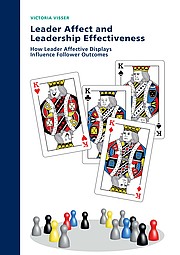Leader Affect and Leadership Effectiveness: How leader affective displays influence follower outcomes Defended on Friday, 7 June 2013
The aim of this dissertation is to uncover the relationship between leader affective displays and leadership effectiveness. Five empirical studies were conducted to test the influence of several leader affective displays on different follower outcomes that indicate leadership effectiveness.
The results showed that leader happy displays enhance followers’ creative performance, whereas leader sad displays enhance followers’ analytical performance. In addition, a leader displaying happiness is rated as more effective than a leader displaying sadness, independent of followers’ performance. Moreover, increased follower happiness mediated the effects of leader happy displays on followers’ creative performance and followers’ ratings of their leader’s effectiveness indicating that emotional contagion processes play a role. Another line of research demonstrated that a leader displaying sadness yields more long-term focused decisions than a leader with a happy, angry or an affective neutral display. This effect is mediated by follower sadness, thus driven by emotional contagion. Furthermore, leader sad displays increase followers’ long-term decisions particularly for followers who have a chronic tendency to experience negative affect. The final study revealed that sad leader displays combined with pro-self leader instructions enhanced followers’ unethical behaviors. When leaders display happiness, anger, or no affect (neutral), followers’ unethical behaviors are not influenced differently by the pro-self or the pro-social leader instructions.
All studies together provide a solid base for the main ways in which leader affect influences leadership effectiveness. Leader happy, sad and angry displays differently influence followers’ performance, decisions, unethical behaviors and ratings of their leader’s effectiveness. Consequently, leaders who display the kind of affect that is most optimal within a certain context will be the most effective leaders.
Keywords
leader affect; leadership effectiveness; emotional contagion; follower performance; intertemporal decisions; unethical behavior











